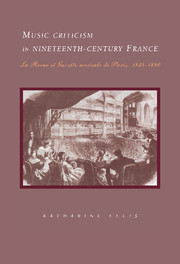Book contents
- Frontmatter
- Contents
- Acknowledgements
- List of abbreviations
- Introduction
- 1 Crosscurrents in early nineteenth-century criticism
- 2 The rise of the specialist press from 1827
- 3 Early music
- 4 The Austro-German tradition I: The reception of Gluck, Haydn and Mozart
- 5 The Austro-German tradition II: The reception of Beethoven
- 6 The Austro-German tradition III: Weber, Schubert and Mendelssohn
- 7 Contemporary music I: Piano music
- 8 Contemporary music II: Chamber and symphonic music
- 9 Contemporary music III: Opera
- 10 Contemporary music IV: The music of the future
- 11 Contemporary music V: Berlioz
- Conclusion
- Appendix 1 Principal contributors to the Gazette
- Appendix 2 Personalia
- Appendix 3 Contes, nouvelles, dialogues and other short literature in Schlesinger's Gazette musicale, 1834–46
- Appendix 4 Publishing history of the Gazette
- Appendix 5 Pseudonyms and attributions
- Bibliography
- Index of musical works cited
- General index
2 - The rise of the specialist press from 1827
Published online by Cambridge University Press: 22 September 2009
- Frontmatter
- Contents
- Acknowledgements
- List of abbreviations
- Introduction
- 1 Crosscurrents in early nineteenth-century criticism
- 2 The rise of the specialist press from 1827
- 3 Early music
- 4 The Austro-German tradition I: The reception of Gluck, Haydn and Mozart
- 5 The Austro-German tradition II: The reception of Beethoven
- 6 The Austro-German tradition III: Weber, Schubert and Mendelssohn
- 7 Contemporary music I: Piano music
- 8 Contemporary music II: Chamber and symphonic music
- 9 Contemporary music III: Opera
- 10 Contemporary music IV: The music of the future
- 11 Contemporary music V: Berlioz
- Conclusion
- Appendix 1 Principal contributors to the Gazette
- Appendix 2 Personalia
- Appendix 3 Contes, nouvelles, dialogues and other short literature in Schlesinger's Gazette musicale, 1834–46
- Appendix 4 Publishing history of the Gazette
- Appendix 5 Pseudonyms and attributions
- Bibliography
- Index of musical works cited
- General index
Summary
A philosopher of music history: F.-J. Fétis
Despite their seemingly Classical outlook and their exact contemporaneity, Castil-Blaze and Fétis were critics of very different kinds. Fétis, by far the more intellectual and ambitious as a critic, was, by his death in 1871, the undisputed doyen of music journalism in France – despite residing in Brussels from 1833 onwards. The impact of his thought on French critics working in virtually every branch of the discipline has yet to be appreciated fully, and merits a study in itself. The Revue musicale, which Fétis produced almost single-handedly from 1827 to 1833, and direction of which was passed to his son until its close in 1835, is a supremely important cultural document of the years preceding and inaugurating the July Monarchy. It is important not only because of the range of subject matter about which Fétis wrote with authority (though not without pedantry), but also because many of the ideas contained within his criticism represent the application to music of important cultural and philosophical notions of the 1820s. The sheer force and originality of Fétis's arguments, combined with the length of his career, ensured that his ideas, born of the heady intellectual atmosphere of the Sorbonne during the Restoration, outlived him. The history of the Revue musicale and its criticism has been treated in detail elsewhere; the philosophical context of Fétis's thought has received less attention.
- Type
- Chapter
- Information
- Music Criticism in Nineteenth-Century FranceLa Revue et gazette musicale de Paris 1834–80, pp. 33 - 55Publisher: Cambridge University PressPrint publication year: 1995
- 2
- Cited by



